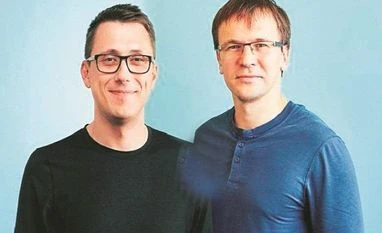Brad Hoover wants the world to write better English — error-free, no plagiarism and, of course, with proper grammar.
He’s not a teacher or politician. Hoover, 43, is a former venture capitalist who’s now chief executive officer of Grammarly, a San Francisco-based company that uses artificial intelligence to enhance writing.
Started by three Ukrainians in 2009, Grammarly has more than 600 employees and works with more than half a million applications to analyse 14 trillion words a year for its 30 million daily active users across the globe. With the majority of English speakers worldwide located in regions where it’s not the main language, there’s still ample room to expand, Hoover said.
Grammarly is already one of the world’s biggest unicorns after raising $200 million in November from investors including BlackRock and Baillie Gifford, valuing the company at $13 billion. Its previous funding round came in 2019 at a valuation of more than $2 billion. That was just months before the Covid-19 pandemic displaced tens of millions of office workers and left them typing to colleagues from home.
“We saw our business accelerate with the move to remote work,” Hoover said. “In the past, people were left to their own devices to figure out how to communicate well. We’re now at a very unique point in time to use software to enable people to communicate.”
Grammarly has made billionaires of at least two of its founders, Max Lytvyn and Alex Shevchenko, who are worth at least $2.4 billion each, according to the Bloomberg Billionaires Index. Backers who participated in funding rounds hold a 23 per cent stake, data from PitchBook and Bloomberg show.
Hoover declined to disclose his position or that of Grammarly’s third co-founder, Dmytro Lider, only saying that “as an employee group, we havethe majority.”
Grammarly is one of several upstart tech companies with roots in the former Soviet bloc, where tycoons have typically minted their fortunes in commodities. GitLab, a software-tools platform that went public in October, was founded by two Ukrainians; Vlad Yatsenko helped create financial-services firm Revolut ; Latvian-born Valery Vavilov started Bitfury Group, a provider of crypto-mining equipment; and Romania’s Daniel Dines began automation-software maker UiPath.
“We’re proud to represent Ukraine on the world stage,” Shevchenko said in an email.
Shevchenko and Lytvyn became friends while studying business administration at the International Christian University of Kyiv in the late 1990s before they moved to the US and Canada to pursue masters’ degrees in that field. The idea for Grammarly came from a previous company they created to help prevent plagiarism.
“We founded Grammarly with the goal of using technology to help people communicate what they mean, a mission born from our own experiences as non-native English speakers,” Shevchenko said. “Our roots gave us a unique perspective on the complexity and power of language in helping people reach their goals.”
Lytvyn, who along with Shevchenko is a Canadian citizen, has said he prioritised customer service in the company’s early days, when it was built for universities. Soon after starting Grammarly, he told the help desk to transfer calls to him, and he would ask users about the product until they hung up.
The company’s breakthrough came in 2014, when it offered a free plan with basic features and the option to pay for advanced ones. A year later, it released free browser extensions. That helped it build a loyal base of customers and about 30,000 teams at big-name companies, including Expedia Group and Cisco Systems.
Hoover, for his part, has been at Grammarly for more than a decade, joining in 2011.
Unlock 30+ premium stories daily hand-picked by our editors, across devices on browser and app.
Pick your 5 favourite companies, get a daily email with all news updates on them.
Full access to our intuitive epaper - clip, save, share articles from any device; newspaper archives from 2006.
Preferential invites to Business Standard events.
Curated newsletters on markets, personal finance, policy & politics, start-ups, technology, and more.
)